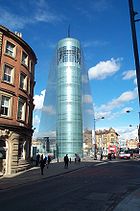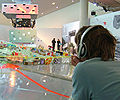
Urbis
Encyclopedia

Manchester
Manchester is a city and metropolitan borough in Greater Manchester, England. According to the Office for National Statistics, the 2010 mid-year population estimate for Manchester was 498,800. Manchester lies within one of the UK's largest metropolitan areas, the metropolitan county of Greater...
, England. From 2002 to 2010, the centre hosted changing exhibits on popular culture topics including urban living, art, music, fashion, photography and videogames alongside talks, gigs and special events.
As of July 2011, Urbis is temporarily closed while the interior space is adapted before opening as the National Football Museum
National Football Museum
The National Football Museum was a museum in Preston, Lancashire, England founded to preserve, conserve and interpret several important collections of association football memorabilia. It was built outside Deepdale, which as of 2010 is the oldest continuously used football league ground in the world...
later in the year.
Architecture and design
Urbis is located in a unique building in Cathedral GardensCathedral Gardens
Cathedral Gardens is an open space within Manchester City Centre, in North West England. It is bounded by Victoria railway station to the north, Chetham's School of Music to the west, the perimeter of Manchester Cathedral and The Triangle on Fennel Street to the south and Urbis to the...
, designed by Ian Simpson Architects
Ian Simpson Architects
Ian Simpson Architects is an English architecture practice established in 1987 by Ian Simpson and Rachel Haugh. The practice is based in Manchester with offices in London....
with consulting engineers Martin Stockley Associates
Stockley
Stockley is a small village in the civil parish of Heddington situated south of Calne in Wiltshire, England. It is almost contiguous with the larger village of Heddington, which is less than 1 km away....
. The building opened in June 2002 as part of the redevelopment of Exchange Square
Exchange Square (Manchester)
Exchange Square is located in the English city of Manchester. The square was heavily redeveloped after the IRA 1996 Manchester bombing. This reconstruction included the moving of two pubs to make room for the new Marks & Spencer store....
known as the Millennium Quarter.
History
Urbis, a museum and exhibition centre intended to showcase inner-city life, opened on 27 June 2002 as part of regeneration after the 1996 Manchester bombing1996 Manchester bombing
The 1996 Manchester bombing was an attack carried out by the Provisional Irish Republican Army on 15 June 1996 in Manchester, England. The bomb, placed in a van on Corporation Street in city centre, targeted the city's infrastructure and economy and caused widespread damage, estimated by...
. The project attracted £30 million funding from the Millennium Commission
Millennium Commission
The Millennium Commission in the United Kingdom was set up to aid communities at the end of the 2nd millennium and the start of the 3rd millennium. It used funding raised through the UK National Lottery....
and £1 million from Manchester City Council
Manchester City Council
Manchester City Council is the local government authority for Manchester, a city and metropolitan borough in Greater Manchester, England. It is composed of 96 councillors, three for each of the 32 electoral wards of Manchester. Currently the council is controlled by the Labour Party and is led by...
towards the running costs. The exhibition space covered five floors and hosted temporary exhibitions running for between three and five months.
Museum of the City (2002–2004)
The museum's first director quit in March 2003, amid criticism that Urbis was not appealing and the exhibits were too abstract. First year visitor figures fell 58,000 short of its 200,000 target and the Millennium CommissionMillennium Commission
The Millennium Commission in the United Kingdom was set up to aid communities at the end of the 2nd millennium and the start of the 3rd millennium. It used funding raised through the UK National Lottery....
who provided £20m of funds threatened to reclaim its money if Manchester City Council had to close the centre.
Visitors paying a £5 admission fee were unimpressed and there were few return visits which the management saw as a key problem. By October 2003, visitor numbers were less than 200 a day and criticism mounted as to whether a £2m subsidy from Manchester City Council was money well spent although Urbis did garner some praise in other quarters.
A move aimed at giving Urbis a clear identity was made, as many had queried its purpose and in an attempt to boost visitor figures, the admission fee was scrapped in December 2003. The plan worked, visitor figures trebled by January 2004 steadily increasing to fivefold by April 2004.
Urbis' chief executive admitted in 2010 that the 'Museum of the City' which ran from 2002 to 2004, "just didn't work".
Popular culture (2004–2010)
In 2004, a radical decision was taken to rebrand Urbis as an exhibition centre for British popular culture with emphasis on Manchester and would no longer be referred to as a museum in an attempt to give it a clear identity. With no admission fee, Urbis shook off its white elephantWhite elephant
A white elephant is an idiom for a valuable but burdensome possession of which its owner cannot dispose and whose cost is out of proportion to its usefulness or worth...
title with visitor numbers rising and over a quarter of visitors from outside the city.
National Football Museum (2011–present)
Urbis closed in February 2010 ahead of the conversion to house the National Football MuseumNational Football Museum
The National Football Museum was a museum in Preston, Lancashire, England founded to preserve, conserve and interpret several important collections of association football memorabilia. It was built outside Deepdale, which as of 2010 is the oldest continuously used football league ground in the world...
from the summer of 2011, controversially making a majority of the staff redundant. This was followed by a decision to close the 'Modern' bar and restaurant. Plans to relocate the National Football Museum from Preston in Lancashire
Lancashire
Lancashire is a non-metropolitan county of historic origin in the North West of England. It takes its name from the city of Lancaster, and is sometimes known as the County of Lancaster. Although Lancaster is still considered to be the county town, Lancashire County Council is based in Preston...
emerged in 2009 The museum trustees cited long-term funding worries as the reason for relocating to Manchester where they hoped to attract 400,000 visitors a year – four times the previous figure.
Preston City Council were unhappy at the proposals and in an effort to thwart the move, the University of Central Lancashire
University of Central Lancashire
The University of Central Lancashire is a university based in Preston, Lancashire, England.The university has its roots in The Institution For The Diffusion Of Useful Knowledge which was founded in 1828. In 1992 it was granted University status by the Privy Council...
, Lancashire County Council
Lancashire County Council
Lancashire County Council is the upper-tier local authority for the non-metropolitan county of Lancashire, England. It currently consists of 84 councillors, and is controlled by the Conservative Party, who won control of the council in the local council elections in June 2009, ending 28 years of...
and Preston City Council put together a bid worth £400,000 per year to the museum; however, they were outbid by Manchester City Council
Manchester City Council
Manchester City Council is the local government authority for Manchester, a city and metropolitan borough in Greater Manchester, England. It is composed of 96 councillors, three for each of the 32 electoral wards of Manchester. Currently the council is controlled by the Labour Party and is led by...
's bid of up to £2 million per year. Upon the museum's opening, admission will be free and a broad advertising campaign will aim to attract visitors to Urbis.
History of exhibitions and events
2009State of Art: New York which was exhibited from April to September showcased the contemporary art scene in New York
New York
New York is a state in the Northeastern region of the United States. It is the nation's third most populous state. New York is bordered by New Jersey and Pennsylvania to the south, and by Connecticut, Massachusetts and Vermont to the east...
. Videogame Nation chartered the rise of video games over the past four decades and how the industry has since become a multi-billion pound industry whose horizons have opened to new 'casual gamers' with the success of the Wii and Nintendo DS
Nintendo DS
The is a portable game console produced by Nintendo, first released on November 21, 2004. A distinctive feature of the system is the presence of two separate LCD screens, the lower of which is a touchscreen, encompassed within a clamshell design, similar to the Game Boy Advance SP...
. The Best of Manchester Awards 2009, the annual exhibit, celebrated Mancunian culture in 2009. Home Grown: The Story of UK Hip Hop, which was exhibited from October 2009 to February 2010 was the first attempt in the UK to document the hip-hop music scene. Manchester, Television & the City: Ghosts of Winter Hill, explored Manchester successful television industry with companies such as Granada Television
Granada Television
Granada Television is the ITV contractor for North West England. Based in Manchester since its inception, it is the only surviving original ITA franchisee from 1954 and is ITV's most successful....
, BBC North
BBC North
BBC North is a brand used by the BBC to mean any of the following.*The large BBC North region, centred on Manchester, that was active from the late 1920s until 1968....
and the programmes created in Manchester. The exhibition was created to coincide with the digital switchover in the Granada region and the continuing move to MediaCityUK.
2008
- Reality Hack: Hidden Manchester
- The Manchester Zinefest
- How MangaMangaManga is the Japanese word for "comics" and consists of comics and print cartoons . In the West, the term "manga" has been appropriated to refer specifically to comics created in Japan, or by Japanese authors, in the Japanese language and conforming to the style developed in Japan in the late 19th...
took over the world - Urban Gardening
- Emory DouglasEmory DouglasEmory Douglas worked as the Minister of Culture for the Black Panther Party from 1967 until the Party disbanded in the 1980s...
retrospective - My first Pride
2007
- The HaçiendaThe HaçiendaFac 51 Haçienda was a nightclub and music venue in Manchester, England. It became most famous during the "Madchester" years of the late 1980s and early 1990s, during the 1990s it was labelled the most famous club in the world by Newsweek magazine...
25 The Exhibition: Fac 491 - D&AD Exhibition: The Best Design and Advertising in the World
- Catapult 07
- Arrivals & Departures: New Art Perspectives of Hong Kong
- PLAY: Experience the Adventure of Our Cities
- City 'til I Die?
- Best of Manchester
2006
- Under Surveillance
- British Art Show 6
- Little Black Dress
- D&AD: The Best Advertising Design in the World
- Manchester 0161: This is what we're made of
- The China Show
- Make Me Shine
2005

- Rock 'n' Roll Icons: the photography of Mick Rock
- Punk: Sex, Seditionaries and the Sex Pistols
- SuperCity
2004
- Manchester 24
- ILL COMMUNICATION II
- DTroit
- The Sounds of Two Cities
- Futuresonic04
- The Peter Saville Show
2003
- Compost Cities
- Ill Communication
- Taxi!
- Heliodays in the rainy city
2002
- Architecture by Stealth

